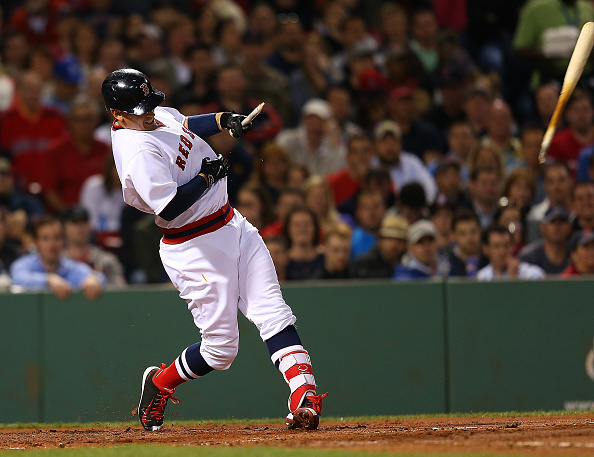When you think of Red Sox at certain positions, who comes to mind? Do you think of the greatest there, or the worst? Maybe they both come to mind for you. The worst of the worst leave a bad taste in the mouths of fans and often get remembered for years to come. A couple of guys on this list of the worst first basemen in team history have gotten a lot of publicity for the wrong reasons.
Allen Craig
Allen Craig was a good hitter once upon a time. Between 2011 and 2013 Craig batted .312 for the St. Louis Cardinals. There was slight reason for concern; Craig’s power had dipped in 2013, falling off from 22 home runs to 13. His slugging percentage, which had been over .500 for consecutive seasons, fell to .457. He also was dealing with foot problems and was heading for offseason surgery.
After Craig’s foot surgery he was not the same. In 2014 he batted .237 for the Cardinals and was struggling to drive the ball. He was still hobbled by his surgery, anyone who watched him could see he didn’t run well or move well in the field. The Red Sox must have failed to scout him. At the trade deadline the Red Sox traded one of their best pitchers, John Lackey, for Craig and Joe Kelly. As I said at the time in arguments with my brothers, Allen Craig was a subtraction from the deal, he made it worse rather than add anything positive. He had a big contract and could barely run.
In addition to the rest of the 2014 season, the Red Sox have paid Allen Craig 25.5 million dollars over the past three seasons. In that time he has driven in exactly five runs for the Red Sox. Over 173 at-bats, Craig has hit .139 with two home runs, five runs batted in and a .432 OPS! It’s almost impressive just how bad he has been. He was sent to the minors and hasn’t even been on the 40 man roster the past two seasons. In 2016 Craig batted .173 with a homer over 75 at-bats in Pawtucket. Last season he managed to bat .253 with a single homer over 158 at-bats in AAA. Craig is the worst of the worst.
Tony Clark
There was plenty of reason for optimism when the Red Sox signed Tony Clark for the 2002 season. The Red Sox needed a slugger at first base and Clark appeared to be just that. Since his rookie season of 1996 Clark had hit 153 home runs for the Tigers. This averaged out to 26 home runs per season or 34 home runs per 162 games played. This came with a .278 batting average and .357/.506/.863 triple slash. Those are some pretty impressive numbers. On top of that, Tony Clark had hit the ball very well at Fenway Park. For his career at Fenway Tony Clark had batted .382 with 6 home runs over 110 at-bats. The pairing seemed to be a good one.
Clark’s Red Sox campaign started off as expected. On opening day against the Blue Jays Clark had three hits and a home run, drawing a walk and driving in three. That was pretty much the extent of Clark’s success with the Red Sox. For the season, Clark batted just .207 with three home runs. His OPS was by far a career low, including the rest of his career, at a measly .556. Anyway you measure it, his season in Boston was the worst of his career and an unmitigated disaster.
First baseman Tony Clark of the Boston Red Sox swings at the pitch during the game against the New York Yankees at Fenway Park on April 13, 2002. The Red Sox defeated the Yankees 7-6. (Photo by Al Bello/Getty Images)
Danny Cater
Cater is on here more for what was given up to acquire him than he is for his performance. His performance wasn’t good, but it wasn’t nearly as bad as the two above him on the list. Cater had bounced around the field, playing both corners of the infield as well as some outfield. He was a solid hitter, but nothing special. Before the Red Sox traded for him he was a .279 career hitter with an OPS of just .695. Who knows what possessed Richard O’Connell to trade Sparky Lyle for him. Lyle was a 27 year old reliever with a 2.85 career ERA and 69 saves. Cater was a 32 year old mediocre hitter.
Lyle pitched the next seven seasons for the Yankees, saving 141 games and winning a Cy Young Award. Cater spent three mediocre seasons with the Red Sox. His first season was by far his most playing time with the Red Sox, accumulating 317 at-bats. He only batted .237 and hit 8 home runs. The following season he actually hit a career high .313, although he only homered once. In his final season he managed to hit five homers in 126 at-bats while batting .246. In three season’s total, Cater batted .262 with 14 home runs and a .685 OPS.
